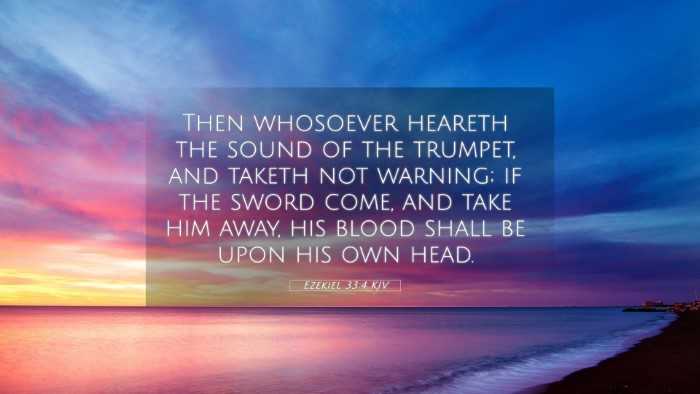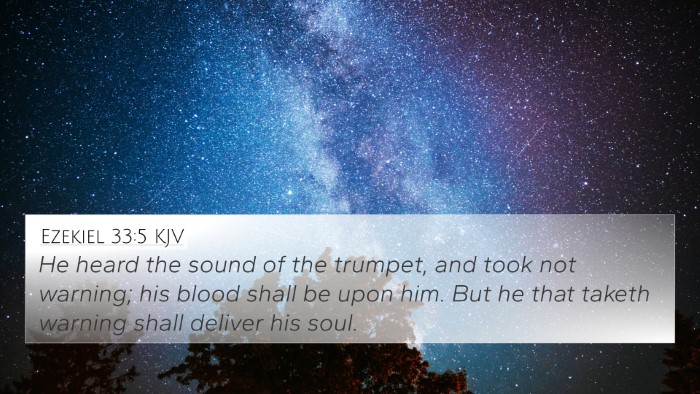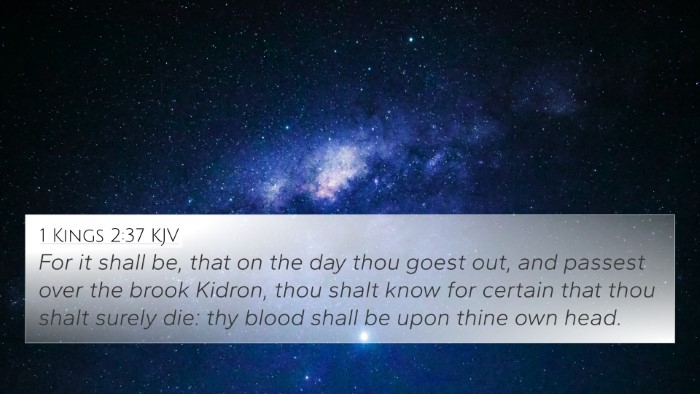Ezekiel 33:4 - Summary and Interpretation
Bible Verse: Ezekiel 33:4 - "Then whosoever heareth the sound of the trumpet, and taketh not warning; if the sword come, and take him away, his blood shall be upon his own head."
Meaning and Insights
This verse from Ezekiel emphasizes the importance of being attentive to warnings, particularly in the context of spiritual and moral vigilance. The prophet Ezekiel, often referred to as a watchman, is given a critical role in alerting the people of Israel to impending danger. Here are key insights based on public domain commentaries:
-
Matthew Henry's Commentary
Matthew Henry discusses the role of the watchman in detail, recognizing the responsibility placed on those who have the duty to warn others. The trumpet symbolizes a clear signal for impending judgment. If individuals fail to heed this warning, they bear the consequences of their inaction. Henry's analysis underscores individual accountability in the face of divine warnings.
-
Albert Barnes' Notes on the Bible
Albert Barnes elaborates on the imagery of the trumpet and its historical significance as a warning system. He draws parallels to biblical instances where God communicates His intentions to His people. Barnes emphasizes that those who ignore the warnings do so at their own peril and that they are responsible for their fate, as portrayed in this verse.
-
Adam Clarke's Commentary
Adam Clarke provides a contextual analysis, considering the audience's understanding of the watchman’s role in ancient Israel. He highlights that the sounding of the trumpet calls for immediate action and that ignoring it reflects a state of negligence toward divine guidance. Clarke also emphasizes God's justice, asserting that the accountability lies solely upon those who choose to disregard the warning.
Bible Verse Cross-References
This verse connects deeply with various other scriptures that echo the themes of warning, accountability, and the consequences of neglecting divine messages. Here are notable cross-references:
- Jeremiah 6:17: "Also I set watchmen over you, saying, Hearken to the sound of the trumpet. But they said, We will not hearken." - This verse reinforces the importance of watching and listening for divine warnings.
- Isaiah 58:1: "Cry aloud, spare not, lift up thy voice like a trumpet, and shew my people their transgression..." - Here, the call to warn is similarly depicted via trumpet imagery.
- Romans 2:6: "Who will render to every man according to his deeds." - This New Testament verse echoes the theme of individual responsibility in response to God’s warnings.
- Matthew 24:6-13: This passage discusses warnings of deception and disaster, urging believers to remain vigilant.
- Luke 12:47: "And that servant, which knew his lord's will, and prepared not himself, neither did according to his will, shall be beaten with many stripes." - Again, emphasizing accountability.
- Proverbs 1:24-26: "Because I have called, and ye refused; I have stretched out my hand, and no man regarded; But ye have set at nought all my counsel..." - Reflecting the consequences of ignoring warnings.
- Hebrews 2:1-3: "Therefore we ought to give the more earnest heed to the things which we have heard, lest at any time we should let them slip." - A call to heed divine instructions seriously.
Connections between Bible Verses
The themes presented in Ezekiel 33:4 create a dialogue across different scriptural texts. The following points highlight these connections:
- Theme of Warning: The metaphor of the trumpet is prevalent across various prophets, creating a strong thematic link.
- Accountability: Each referenced verse reinforces personal responsibility in response to God's messages.
- Consequences of Neglect: Several scriptures address the outcomes of ignoring divine instructions, making Ezekiel 33:4 a pivotal study point.
Thematic Bible Verse Connections
When exploring the larger context of accountability and warning in Scripture, looking at the broader thematic connections enriches understanding:
- Judgment: The notion of accountability before God spans both the Old and New Testaments.
- Guidance: Prophetic messages frequently call for an attentive ear to divine counsel.
- Disciplinary Measures: Scriptures consistently outline the disciplinary actions taken against those who ignore God’s guidance.
Conclusion
The message of Ezekiel 33:4 serves as a timeless warning for all believers. It encourages diligent spiritual awareness and emphasizes the grave consequences of negligence in heeding God’s warnings. Through cross-referenced scriptures, one can explore how this message resonates throughout the Bible, providing a substantial framework for understanding the importance of being responsive to divine callings.

















